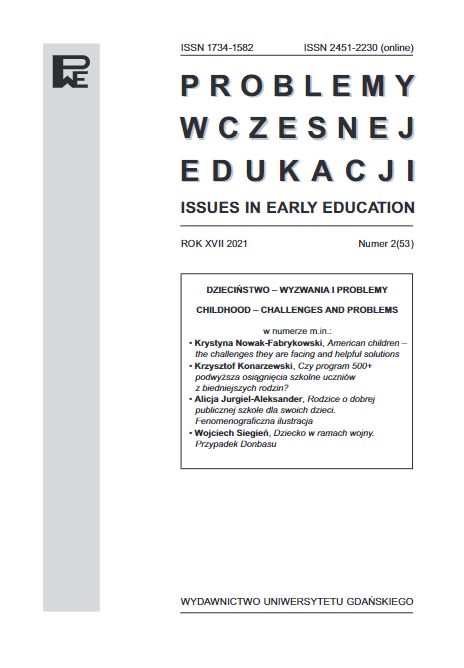Rodzice o dobrej publicznej szkole dla swoich dzieci. Fenomenograficzna ilustracja
DOI:
https://doi.org/10.26881/pwe.2021.53.03Słowa kluczowe:
dobra edukacja, szkoła publiczna, badanie fenomenograficzne, instrumentalizm, rodzice dzieci w wieku wczesnoszkolnymAbstrakt
The purpose of this article is to try to empirically face the phenomenon of a good public school. However, not by following legislation demonstrating its public status, but by means of a simple question addressed to the parents of pupils in grades I to III as to how this phenomenon is understood by them. Based on a conversation with her parents, the author has made a phenomenographic reconstruction of the concepts behind the importance of a good public school. It turned out that, according to the parents, a good public school is identified with modern teaching methods (a), it is treated as an instrument for preserving the social status of the student (b), a tool for conveying the desired values (c), its meaning lies in shaping the disposition to learn. The author shows that in a cultural sense, the revealed categories of description show that it is difficult for us still to go beyond instrumental rationality in search of the meaning of a modern good public school and public good education.
Downloads
Bibliografia
Bernstein B. (1996), Pedagogy, symbolic, control and identity. Theory, research, critique. London– Bristol, Routledge.
Jurgiel A. (2009), O możliwościach poznawczych fenomenografii. „Pedagogika Kultury”, 5.
Jurgiel-Aleksander A. (2020), Good education and its instrumental description in the narrations of adults who have become students. „Dyskursy Młodych Andragogów”, 21.
Kwieciński Z. (2016), Społeczeństwo wychowujące w zagrożeniu? Kryzys jako źródło nadziei. Zaproszenie do dyskusji. „Pedagogika Szkoły Wyższej”, 2.
Leder A. (2019), Prześnione rewolucje. Ćwiczenia z logiki historycznej. Warszawa, Wydawnictwo Krytyki Politycznej.
Marton F. (1986), Phenomenography: a research approach to investigating different understanding of reality. „Journal of Thought”, 21(3).
Pobłocki K. (2021), Chamstwo. Wołowiec, Wydawnictwo Czarne.
Potulicka E. (2010), Pedagogiczne koszty reform skoncentrowanych na standardach testowania. W: E. Potulicka, J. Rutkowiak, Neoliberalne uwikłania edukacji. Kraków, Oficyna Wydawnicza „Impuls”.
Rosa H. (2020), Przyspieszenie, wyobcowanie, rezonans. Gdańsk, Wydawnictwo Europejskie Centrum Solidarności.
Rutkowiak J. (2010), Neoliberalna kultura indywidualizmu a dialogowanie społeczno-edukacyjne. W: E. Potulicka, J. Rutkowiak, Neoliberalne uwikłania edukacji. Kraków, Oficyna Wydawnicza „Impuls”.
Szkudlarek T. (2006), Parcelacje. Topografie społeczeństwa wiedzy. W: M. Mendel (red.), Pedagogika miejsca. Wrocław, Wydawnictwo Naukowe DSWE.

 Uniwersyteckie Czasopisma Naukowe
Uniwersyteckie Czasopisma Naukowe





